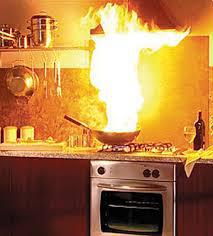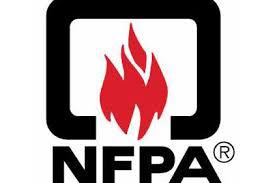| October 12, 2020 | |
| Several recent fire incidents in our area should serve as safety lessons for homeowners about the risk of fires in the kitchen -- and the importance of working fire detection systems. According to the National Fire Protection Association (NFPA), US Fire Departments responded to an estimated average of 172,900 home structure fires per year started by cooking activities in 2014-2018. These fires caused an average of 550 civilian deaths, 4,820 reported civilian fire injuries, and more than $1 billion in direct property damage per year. You might be surprised to learn many fires in the kitchen also happen when no one is home! How is that possible? Here are two actual, real-life situations that took place in the Avon Grove community in the last 60 days: In Penn Township, a family pet started a fire that could have been damaging. In this situation, defrosting chicken was left on a stove top. A family pet jumped up on the stove and accidentally turned on a gas burner. The burning Styrofoam and plastic set off smoke alarms that notified the Alarm Company, who called West Grove Fire Company. Nobody was home when our firefighters forced the front door and found a house full of smoke. Safety Lesson #1: keep food products off the stove unless you are actually cooking -- and, where possible, "lock" stove controls to avoid them accidentally being turned on by pets. Remnant cooking smells and spills can lead to dogs jumping up and hitting controls -- especially controls on the front or top front of the stove or cook top. Safety Lesson #2: centrally-monitored fire alarms systems save lives and property. Systems that can dial out and report a fire save time (especially when no one is home). In our rural community, even a few minutes saved can make the difference in putting out a fire, especially with homes being distant from the nearest fire station. In London Britain Township, a very different situation occurred. In the middle of a large storm, the power went out while cooking was taking place. Because the power went out, the stove was not turned off. When the power came back on many, many hours later, so too did the electric stove and nobody was in the residence when the power returned resulting in burning food. The fire did damage -- however, the damage was limited because the Fire Company was nearby for a different call and was able to quickly respond and put the fire out. Safety Lesson #3: when the power goes out, make sure all appliances that were operating are safely turned off. This not only includes items in the kitchen, but also should include hair dryers, curling irons, power tools, space heaters, etc. Remember, most kitchen fires happen during holidays, with the NFPA report showing that most kitchen fires happen on Thanksgiving and Christmas, and the days before these holidays. Safety Lesson #4: Be mindful at the holidays, with families and friends crowded into kitchens. Burns are the greatest injuries from hot stoves and spills from hot pots tipped over by children. And for all homes, working smoke detectors with fresh batteries provide an early warning on fires that can save lives. Houses filled with guests -- remember, sleeping with bedroom doors closed saves lives in a fire. As we near the holiday season, please keep these safety lessons in mind. For more information, see: https://www.nfpa.org//-/media/Files/News-and-Research/Fire-statistics-and-reports/US-Fire-Problem/Fire-causes/oscooking.pdf . |
|

